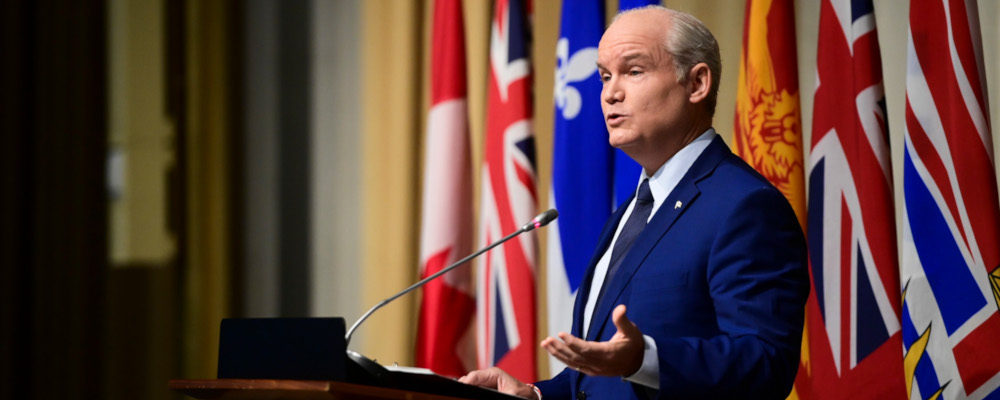In the 1996 British Columbia provincial election, the B.C. Liberal Party under Gordon Campbell won 42 percent of the vote compared to 39 percent for incumbent Premier Glen Clark’s NDP. Despite having lost the popular vote, Clark stayed on as premier anyway as the electoral system transformed the NDP’s votes into 39 seats and the Liberals’ into just 33. The result sparked outrage in B.C. as it was seen to be illegitimate: the single-member plurality (SMP) electoral system had unfairly handed the NDP a majority government.
Campbell, for his part, responded to the perverse result by sensibly calling for SMP to be reviewed and possibly replaced. He proposed a citizens assembly made up of regular British Columbians from throughout the province who would come together to contemplate and ultimately recommend whether the province should change its electoral system, which would inform the choices in a subsequent referendum.
After finally winning in the 2001 B.C. election, Premier Campbell kept his word and convened the assembly (full disclosure: I worked for the assembly while I was a graduate student, and it was an enormously memorable and cool experience). The assembly recommended the province switch to a single transferable vote electoral system but this option could not meet the high threshold set in the subsequent referendum campaigns and failed as a result. Confronted with an electoral system that had failed and shaken public confidence, Campbell responded with a thorough review of that system.
Fast forward to 2021. We have now had two federal elections in which the Liberal Party won the most seats—and formed single-party governments on that basis—despite winning fewer votes than the Conservatives. Just as it did in B.C., SMP is now failing in federal elections.
Despite this and the fact that the Conservatives are now systematically disadvantaged by the electoral system, not a single prominent voice in the Conservative Party has called for electoral reform, or even a review of the current system. I understand self-interested Liberal silence on this matter. But Tory silence: that’s a noodle-scratcher.
What could explain this puzzle of Tory reluctance to consider electoral reform? I’ve come across two possible explanations.
The first is that Conservatives are not open to electoral reform because they think they will fare better under the continued use of SMP than under some alternate system. To these cautious Conservatives, a switch is simply too risky.
But what exactly would the party be risking? Canada’s political history, as I have recently noted here at The Hub, is one of Liberal, not Conservative, success: the Liberal Party was in power roughly seven of every ten years in the 20th century, and about three-quarters of the time after the expansion of the franchise. It’s unclear whether the 21st century will turn out any differently for the Conservatives.
SMP is designed to deliver majority governments and, until relatively recently, did so most of the time. This benefitted the Liberals frequently and the Conservatives only every once in a while: think about Robert Borden (1917), John Diefenbaker (1958), Brian Mulroney (1984), and Stephen Harper (2011) and their big wins and subsequent majority governments. Some Tories may think that another Conservative majority is just around the corner if only the right leader can be found; if only the right consultant is placed in charge of the campaign; if only the party vote could be distributed more efficiently across the country; if only; if only.
Surely one more roll of the dice or pull of the lever will produce a jackpot and SMP will come through with another Tory majority. But consider that, in the last three decades, the Conservatives have formed only a single, solitary majority government: Stephen Harper’s, which lasted from 2011 to 2015. One has to go back 23 years from then, all the way to the 1988 election, to find the last Tory majority. Needless to say, winning a majority government once every couple of decades should not be the basis upon which Conservatives continue to bet on the current system.
This is not to say that SMP is entirely to blame for Conservative underperformance. And I’m not just trying to be mean to the party. The point is that the Conservatives could hardly do worse under a different system than they have under SMP and could potentially do quite a bit better, so what is the harm in giving it a shot?
Conservatives could hardly do worse under a different system than they have under SMP
The second explanation for why Conservatives are not open to electoral reform is because there is a sense that, under a more proportional electoral system where parties’ vote shares closely match their seat shares, the Conservative coalition would splinter into its constituent factions and the party would collapse.
This is an intriguing argument and, on its face, is theoretically quite convincing. The idea is that under a proportional electoral system where parties can win seats with a relatively small vote share, there is little incentive for anyone to stick around in a big party within which compromise is necessary and everyone’s views must be aggregated together into one big frustrating bundle. At present, parties must bring a substantial number of different groups and viewpoints within the tent lest SMP obliterates them, as it has done to countless small and single-issue parties throughout Canadian history. But under a more proportional system, all the party’s distinct ideological and regional factions can potentially go create their own parties and win seats without the need to get along within the confines of one big party.
We might reasonably expect this for the Conservative Party under a more proportional electoral system, but what happens in the real world of politics often diverges from theoretical expectations. This was the case in New Zealand, which switched from SMP to a mixed-member proportional (MMP) electoral system in 1996 following a successful referendum. New Zealand’s centre-right National Party did experience some minor defections following the introduction of MMP: four Nat MPs departed in 1995 to create the new United Party which went on to flop in the next election. But, for the most part, the Nationals remained coherent and continued to govern, albeit with the necessary support of Winston Peters’ New Zealand First party for a short time. Even after a period in the opposition, the Nationals came back to power, and in the 2011 election scored a striking 47.3 percent of the vote.
So much for the party falling apart under a proportional electoral system. Instead of collapsing, the Nats did what parties always do: they adapted to new circumstances in order to win power. It’s reasonable to think that Canada’s Conservative Party, which has survived far greater challenges than those posed by electoral reform, would similarly adapt.
The fact that Conservatives are reluctant to pursue electoral reform to remedy their electoral malaise is in some ways admirable. It casts Justin Trudeau’s on-again-off-again love affair with ranked ballot electoral systems in a particularly dim light since everyone knows Liberals prefer that system because they think it will give them an electoral advantage and entrench their dominance in Canadian politics. In contrast, Conservatives’ earnest disinclination to pursue electoral reform to help themselves is downright charming.
Nevertheless, it is the wrong position. Like Gordon Campbell following an outrageous election result, Conservatives should embrace electoral reform for the right reasons: because SMP has become terribly broken and no longer serves Canadian democracy; because it produces strange, perverse results that allocate power in ways not logically connected to the votes Canadians cast; because it will breed alienation from our politics; and because other electoral systems can preserve what is good about SMP while shedding its crazy outcomes. Conservatives have much less to fear from doing the right thing than perhaps they thought they did.




